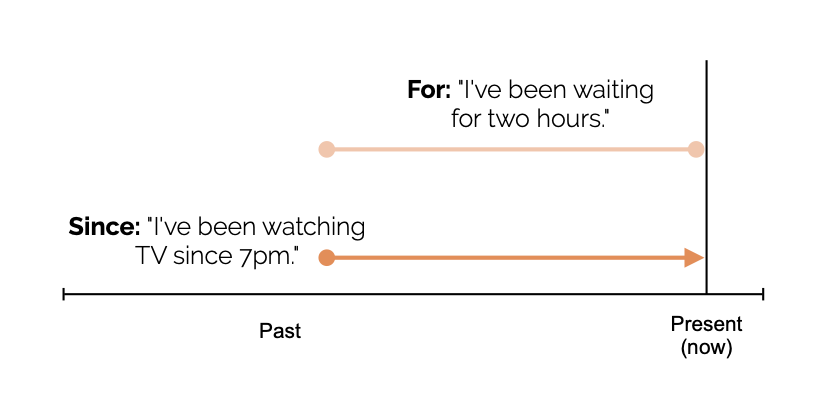“For” and “since” are prepositions used to talk about time. They’re similar but are not interchangeable.
“For” refers to a period of time.
“Since” refers to the beginning of a period of time.

Overview
| For | Since |
| “For” + period of time | “Since” + point in time |
| All tenses | Perfect tenses only |
| Cannot be used with “all” | |
| Can be left out in affirmative sentences |
For
1. Used to refer to a period of time.
In sentences, “for” is followed by a period of time.
- “She disappeared for 3 days.”
- “I haven’t seen you for ages.”
2. “For” can be used with a variety of tenses.
“For” can be used with a variety of different tenses, because time periods can occur in the past, present and future.
Past simple: “I lived in Malaysia for a year.”
Present continuous: “I’m travelling for two weeks.”
Future simple: “I’ll be in Seoul for 9 days.”
* Please note: Present simple tense
The tricky one is the present simple tense, which is usually used to state a fact or make a general statement.
- “A sunset typically lasts for about five minutes.”
- “Some wait for as long as two years to get a visa.”
If you want to talk about continual occurrences, present simple can’t be used with “for.”
- “I live in Australia.”
Not – “I live in Australia for 15 years.”
3. “For” cannot be used with “all”
Time expressions with “all” cannot be used with “for.” These are expressions like “all day,” “all week,” or “all my life.”
- “We were packing all day.”
Not – “We were packing for all day.”
- “I’ve been stuck at home all week.”
Not – “I’ve been stuck at home for all week.”
4. “For” can be left out in affirmative sentences.
However, it is still more usual with “for.”
- “They’ve been married (for) fifteen years.”
- “I lived in Australia (for) almost twenty years.”
This is not usual with negative sentences.
- “We haven’t heard from them for two months.”
Not – “We haven’t heard from them two months.”
Since
1. Used to refer to the beginning of a period of time.
In sentences, “since” is always followed by a time or date.
- “She’s been gone since 12.30.”
- “We haven’t talked since last week.“
Or it can also be followed by an event.
- “I haven’t seen you since Jane’s birthday.”
- “I’ve been learning the piano since I quit my job.”
2. “Since” can only bed used with perfect tenses.
Because “since” only refers to the beginning of a period of time in the past, it can only be used with perfect tenses.
Past perfect continuous: “I had been waiting since 5 o’clock.”
Present perfect: “I’ve known him since we were kids.”
Original posts: 23 March 2020